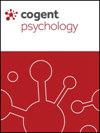COVID-19 related stress, quality of life, and intrinsic religiosity among college students during the global pandemic: A cross-sectional study
IF 1.6
Q2 PSYCHOLOGY, MULTIDISCIPLINARY
引用次数: 2
Abstract
The purpose of this correlational, cross-sectional design study was to examine the relationships between COVID-19-related stress, quality of life (QOL), and intrinsic religiosity of university students during the pandemic. Data were collected using the Psychological General Well-being Index, Impact of Events Scale-Revised, and Duke University Religiosity Index and analyzed using Pearson's r, bivariate analysis, and hierarchical regression analysis. For the sample of 422 participants, COVID-19-related stress was negatively associated with QOL, while religiosity was positively associated with participants' QOL. Religiosity, however, did not moderate the relationship between stress and QOL. Institutions of higher education should consider providing additional mental health support and self-care initiatives to improve student stress responses. Understanding the effects of religiosity on student stress responses and QOL would allow faculty and institutions to prioritize holistic care, including spiritual care in conjunction with religiosity. © 2023 The Author(s). This open access article is distributed under a Creative Commons Attribution (CC-BY) 4.0 license.全球大流行期间大学生与COVID-19相关的压力、生活质量和内在宗教信仰:一项横断面研究
这项相关的横断面设计研究的目的是研究大流行期间大学生与covid -19相关的压力、生活质量(QOL)和内在宗教信仰之间的关系。采用心理总体幸福感指数、事件影响量表和杜克大学宗教虔诚度指数收集数据,并采用Pearson’s r、双变量分析和分层回归分析进行分析。在422名参与者的样本中,与covid -19相关的压力与生活质量呈负相关,而宗教信仰与参与者的生活质量呈正相关。然而,宗教信仰并没有调节压力与生活质量之间的关系。高等教育机构应考虑提供额外的心理健康支持和自我保健举措,以改善学生对压力的反应。了解宗教信仰对学生压力反应和生活质量的影响将使教师和机构优先考虑整体护理,包括与宗教信仰相结合的精神护理。©2023作者。本开放获取文章采用知识共享署名(CC-BY) 4.0许可发布。
本文章由计算机程序翻译,如有差异,请以英文原文为准。
求助全文
约1分钟内获得全文
求助全文
来源期刊

Cogent Psychology
PSYCHOLOGY, MULTIDISCIPLINARY-
CiteScore
2.90
自引率
0.00%
发文量
75
审稿时长
12 weeks
期刊介绍:
One of the largest multidisciplinary open access journals serving the psychology community, Cogent Psychology provides a home for scientifically sound peer-reviewed research. Part of Taylor & Francis / Routledge, the journal provides authors with fast peer review and publication and, through open access publishing, endeavours to help authors share their knowledge with the world. Cogent Psychology particularly encourages interdisciplinary studies and also accepts replication studies and negative results. Cogent Psychology covers a broad range of topics and welcomes submissions in all areas of psychology, ranging from social psychology to neuroscience, and everything in between. Led by Editor-in-Chief Professor Peter Walla of Webster Private University, Austria, and supported by an expert editorial team from institutions across the globe, Cogent Psychology provides our authors with comprehensive and quality peer review. Rather than accepting manuscripts based on their level of importance or impact, editors assess manuscripts objectively, accepting valid, scientific research with sound rigorous methodology. Article-level metrics let the research speak for itself.
 求助内容:
求助内容: 应助结果提醒方式:
应助结果提醒方式:


